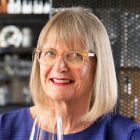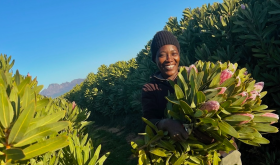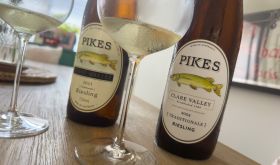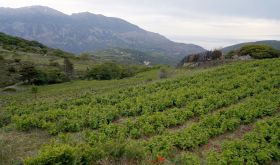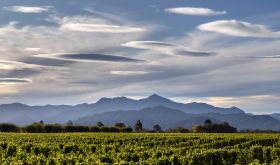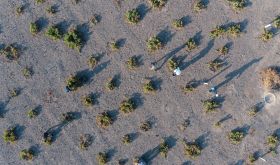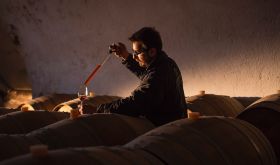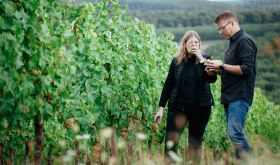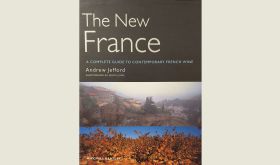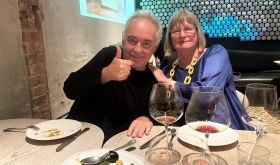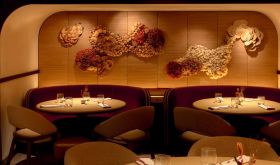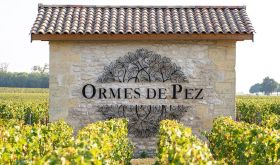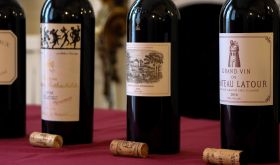From 115 rand, €9.89, 184.90 Norwegian krone, £14.95, NZ$36
I was thrilled when I learned that Reyneke is one of the 30 new-wave South African wine producers to be represented at the forthcoming tasting in Soho on the evening of 23 September. There are still some tickets available at the bargain price of £35 each for a relaxed and truly eye-opening night. Book yours here.
Along with the one described in Plan BEE, my visit to Reyneke was one of the most memorable of many encounters in South Africa last January. Johan Reyneke is quite a hero there, not least for being the first producer in South Africa to be certified biodynamic, acquiring more and more land bit by bit. The Reyneke estate now includes a total of 37 ha (91 acres) with vines growing on 30 ha of them and animals such as cows, ducks, chickens and guinea fowl on the rest. He clearly loves the farm and fully embraces self-sufficiency, growing wheat for his own bread.
His parents moved to the atmospheric homestead where he now lives with his family when he was in his last year of school, in 1988. He studied philosophy, and admits, ‘I had dreadlocks then so it was difficult to get a job’. He had to work as a waiter for a while and had his first experience of wine production at the very, very different De Toren winery next door.

At Reyneke everything is recycled and done by hand. ‘In South Africa we have very affluent multinationals and very poor labourers, so I’d rather not use machines. It’s fun anyway. To me it’s more important to make good wine and enjoy my life than to be biodynamic.’ Johan certainly seems to have his work-life balance in order. I kept hearing about his surfing adventures on my travels around Cape winelands. The pictures above and below are from the winery website.
Since he established biodynamic techniques in the vineyard (Reyneke has been certified biodynamic since 2004), the pH of the soils has gone from 5.5 to 6 or 6.5, so the pH of the wine has gone down and the total acidity has gone up, a common phenomenon. The photo below shows the cow horns Reyneke use to bury the manure that is so important to biodynamic viticulture.

Winemaker Rudiger Gretschel, whom I first met at Boekenhoutskloof in Franschhoek, moved to Reyneke in 2004. He told me that when he arrived the vine canopy was very sparse and when biodynamic pioneer Noel Pinguet from Domaine Huet in Vouvray came to visit in 2007, he warned that it would take up to eight years to have everything in the right balance in the vineyard. I asked him if this was the case and he responded thus: 'I remember the vines having a really tough time in the years from 2004 onwards. The shoot growth in those years was a mere 45 cm and most leaves yellowed and fell off the vines before we even harvested the fruit. The 2009/2010 growing season was a definite turnaround. Everything seemed to be in balance and we didn’t get the remark any more that you can see that the vineyards are farmed biodynamically due to the stunted growth. It was also with the 2010 wines that I believe there was definite improvement in the quality. Since then we have seen huge improvements in both vineyards and the resultant wines. Everything took on a different dimension with the 2013 wines! It is only with these wines that we are starting to show the true potential of the Reyneke site, although I believe the best is still to come!'
Rudiger, who will be pouring Reyneke wines in London next month along with assistant winemaker Jessica Garlick, pointed out during my visit to Reyneke that, after the long-awaited collapse of the apartheid regime, ‘everyone travelled and found the benchmark of, say, Syrah, according to a copy of an archetype, but in fact what we need to do is express a certain site’. The Reyneke wines, many grown on decomposed granite, red wine grapes concentrated on the warmer northern exposures, are designed to do just that, and partly because of this, Rudiger has changed his mind completely about the benefits of (now fashionable) concrete eggs. ‘They’re fine for holding wines for a short time', he told me, 'but any longer than that and the wines get a Nomblot [the manufacturer] taste of chalky concrete. We stopped using them in 2008.’
I was impressed by the entire Reyneke range when I tasted it at the estate last January but I was especially enthusiastic about Reyneke Biodynamic Syrah 2013 Stellenbosch for its interest, charm and obvious integrity. I found it especially winning and attractive but also wonderfully wholesome. I enjoyed the intensity of the red-fruit flavours and the ambitious structure and persistence. I think it will be even better and more interesting next year and should last into the next decade, but overall it already tastes round and velvety. It is clearly not copying northern Rhône and nor is it one of the many South African Syrah/Shirazes that are too redolent of oak, sugar and alcohol. I gave it the massive (for me) score of 17 out of 20. Advertised alcohol level is 14%.
According to the official tech spec, ‘The Syrah undergoes a traditional fermentation in concrete Nomblot tanks, incorporating 35%-40% whole bunches, which are foot crushed. Spontaneous natural fermentation occurs with minimal punch down and punch overs. The wine spends 12 to 14 days on the skins before being racked into older French oak for 14 months’ maturation.’
Perhaps even more to the point, like so any South African wines of all colours, this wine is clearly underpriced. It’s imported into the UK by New Generation although the only retailer cited by Wine-searcher is the excellent James Nicholson of Northern Ireland. Swig, co-organisers of the New Wave South African wine tasting on 23 September, are offering six bottles for £90 online here. According to Wine-searcher, it’s available not only in the UK and South Africa but also in Austria, Belgium, the Netherlands, Norway, New Zealand (all the Ns...). In the US, where the importer is Indigo (nothing to do with the UK importer of the same name) it seems as though the 2011 Syrah is still in (relatively wide) circulation. Unfortunately we don’t have a tasting note on this particular wine but we do have a total of 30 tasting notes on Reyneke wines, red and white, back to 2007.
I can certainly recommend their whites, too. You may remember that my favourite wine of all in a blind tasting of oaked Sauvignons from around the world last year was Reyneke Reserve White 2011. The 2012 and 2013 vintages of this wine are now widely available, in the US and UK and elsewhere. I gave both 17 out of 20.
They are trying to import Sauvignon Gris cuttings, incidentally – presumably to add even more interest to this wine. But apparently they never get through South Africa’s strict quarantine process.
Reyneke is marketed by the giant Vinimark group, for whom Rudiger is director of winemaking, but Reyneke gives every impression of autonomy.
